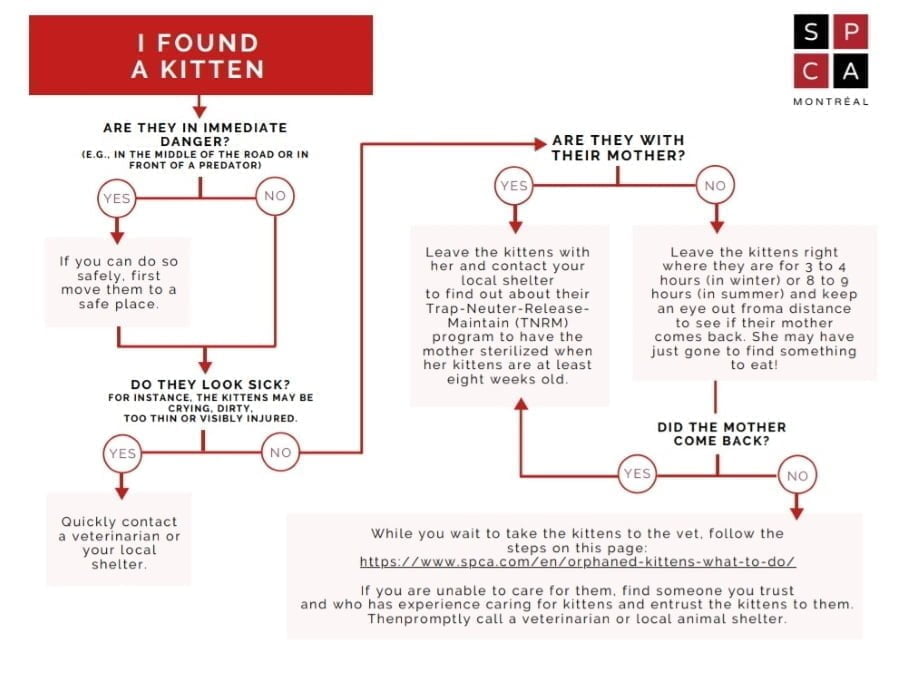So you found a little kitten who seems abandoned? No need to panic. By following these six steps, you’ll be able to properly care for the kitten until you can get to a veterinarian.
1 – Make sure the kitten actually needs your help
Before removing the kitten from where you found her, get a sense of the surroundings. Unless the kitten is in danger, leave her where she is, for up to three to four hours, and keep an eye on her from a distance to see if her mother shows up. She may simply have gone scavenging for food or she may be relocating her babies one at a time.

2 – Provide a safe and comfortable space
If the mother does not return, bring the kitten home and set her up in a closed room — especially if you have other animals at home. Place a blanket at the bottom of a box and place the kitten in it, taking care to add a heat source (see next step).
3 – Provide heating
This step is crucial, because kittens cannot regulate their temperature. Provide her with a heat source, such as a heating cushion or bag (i.e. Magic Bag). The heating cushion or bag should be covered with cloth (you can use an old t-shirt), to avoid the kitten’s skin from being in direct contact with the heat source.
You must provide a heat source before feeding the kitten. If she seems famished but you feel she has not raised her temperature sufficiently, you can apply a drop of corn syrup to her gums. Her glucose levels will go up, which will provide her with enough energy to sustain her until she can be fed.
4 – Feed her… the right way!
Before feeding a kitten, try and estimate her age, because there are two possible scenarios to consider when planning to feed a kitten.
Scenario A: the kitten is between 0 and 21 days old
Less than 7 days: The kitten’s eyes are closed, her ears are folded, the umbilical cord is still attached;
Between 7 and 14 days: The kitten’s eyes are open, her ears are beginning to unfold, the umbilical cord is absent;
Between 14 and 21 days: The kitten’s ears are fully unfolded, her front teeth are visible, she awkwardly tries to walk.
From 0 to 21 days old, the kitten must be fed kitten formula, every three to four hours, with a feeding bottle. You can find the formula and everything else you need to feed a kitten at a pet supply store, the Montreal SPCA’s Boutique or veterinarian.
If you’re unable to purchase these items immediately, you can, as a temporary measure and for a few hours only, feed the kitten using a syringe with no needle (which can be bought at any pharmacy). Use the following recipe: 1 raw egg yolk, mixed together with a small can of unsweetened dehydrated milk.
Warning!
– Never give cow’s milk to a kitten! This could cause diarrhea and lead to more serious health problems.
– A kitten should always be fed on her stomach, not her back. If fed on her back, milk could find its way into her lungs and she could develop pneumonia.
Scenario B: the kitten is 21 days old or more
Between 21 and 28 days old: The kitten explores her surroundings with a higher degree of confidence, her canine teeth are visible, she can retract her claws.
From four weeks old and onward, you can feed the kitten canned cat food, mixed with a little bit of water, four times a day. If she refuses to eat, you’ll need to revert back to the feeding bottle (see scenario A).
5 – Stimulate her so she “goes to the bathroom”
It is the mother cat who stimulates her young to defecate and urinate, during the first three weeks of their lives. In her absence, you’ll need to take care of it! Using a soft and humid tissue, gently rub her abdomen and her anal region, in circles.
6 – Clean her
Generally speaking, we don’t recommend you clean a kitten, because if she isn’t dried appropriately afterwards, she could easily develop hypothermia. However, if the kitten is really quite dirty, you can gently clean her using unscented baby wipes.
This sequence of steps (1 to 6) should be repeated every three to four hours, until you can bring the kitten to a veterinarian. If you find a kitten but are unable to care for her, find someone you trust and who has experience caring for kittens and entrust the kitten to them. Then promptly call a veterinarian or local animal shelter.







